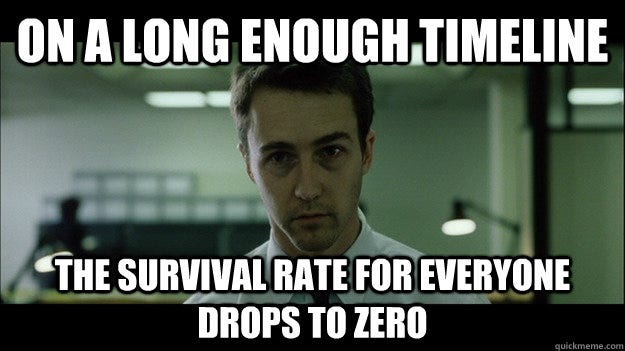Survival of the Fittest
The Survival Rate for Everyone Drops to Zero
Lying in bed before sunrise, considering Herbert Spencer and by extension a general history of philosophy and psychology that had led to this nineteenth century British man who’d coined the phrase, “Survival of the fittest,” and who looked so darkly at the world Will Durant once wrote of him, There was in Spencer a Schopenhauerian sense of the futility of human effort. At the end of his triumphant career he expressed his feeling that life was not worth living. He had the philosopher’s disease of seeing so far ahead that all the little pleasant shapes and colors of existence passed under his nose unseen, something dawned (around dawn) within my dissolving dreams.
Spencer wrote of evolution and psychology and sociology and spent his life in beautiful rumination, rarely saying anything new, or at least rarely saying anything that hadn’t been said before and said better. Nonetheless, his efforts and examinations were beautiful because he saw an angle of life that few see. And in trying to explain this vision to himself he blessed those of his time, because while his expressions had been expressed previously, whether by Aristotle or the Bhagavad Gita, in our small confinements within time, we understand and express understanding differently than those who occur before or after we do. It takes interpreters of patience, like Spencer, to bring ancient and future Truths to our parlance. And, considering him, I had two realizations:
The first, Spencer, were he to live in our time, might have had a penchant for (or even written) this deminihilistic line from Fight Club: “On a long enough timeline the survival rate for everyone drops to zero.”
The second and final realization, was that, while Durant was perhaps right, that Spencer had “the philosopher’s disease of seeing so far ahead,” the antibiotic for this disease is not seeing less, but seeing further. In other words, at a particular moment in personal, psychological evolution, a person will hit the point that Spencer hit, that Chuck Palahniuk (Fight Club) hit, that crystal clarity that nothing matters, that it’s impossible for anything to matter. But we step further into that that abyss and live uncomfortably within the horrifying cycles of death and rebirth and death and rebirth and death and and and, and we may be struck by the opposite Truth: that everything matters. Every little pleasant shape and color of existence in every moment, as we stick and unstick from one moment to the next.
And I lay there, considering Spencer for a few more sticky and wholly meaningful moments, appreciating the everythingness and bothness, knowing the pleasant dull shapes of the room and the pleasant warm force of the bed, before thanking the troubled, dead Brit and getting the fuck up.
